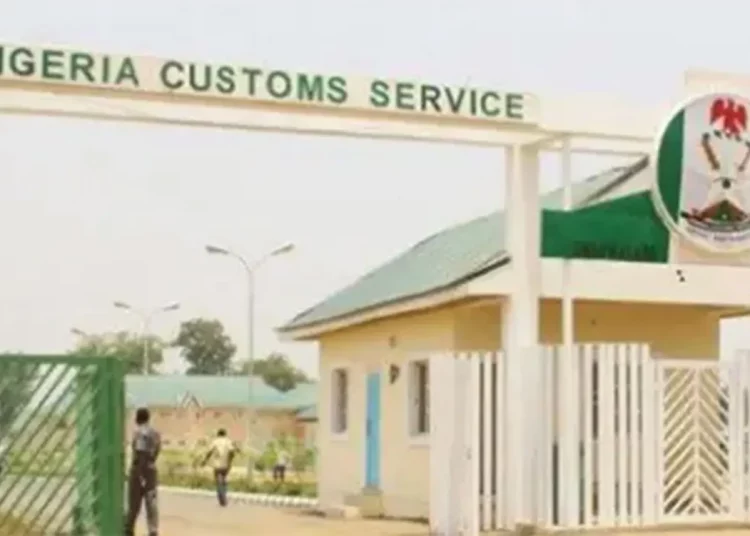The Nigeria Customs Service (NCS), on Wednesday, began sensitisation of stakeholders ahead of the January 2026 full migration from the current Fast Track Scheme to the globally recognised Authorised Economic Operators (AEO) Programme.
The migration, according to the NCS, is part of a broader reform agenda aimed at enhancing trade facilitation and strengthening supply chain security.
Addressing stakeholders, including importers, clearing agents and members of the organised private sector at the event held in Lagos, the comptroller general of Customs, Adewale Adeniyi, stated that the AEO programmer represented a paradigm shift in the way the Customs interact with the private sector.
Represented by the zonal coordinator in charge of Zone ‘A’, assistant comptroller general (ACG) Charles Orbih, Adeniyi highlighted that while the Fast Track Scheme served its purpose for over a decade, it lacked a formal legal framework and was no longer aligned with the dynamic nature of the global supply chain.
The AEO programme, he explained, is a more structured, risk-based, and transparent model developed in line with the World Customs Organisation’s SAFE Framework of Standards.
He said benefits for certified businesses include faster clearance, reduced physical inspections, dedicated service desks, and priority treatment during port congestion, all of which contribute to cost reduction and improved supply chain efficiency.
Adeniyi said a recent Time Release Study (TRS) revealed that AEO-certified businesses already enjoy a significant reduction in cargo clearance time, averaging 43 hours compared to non-AEO traders.
“The AEO programme was first piloted in Nigeria on 15th April 2024, and following thorough testing, capacity building, and stakeholder consultations, the national launch was held on 14th February 2025.
The objective is to identify and reward businesses that demonstrate consistent compliance with Customs and tax regulations by granting them faster, more predictable, and more efficient clearance processes.
“AEO-certified businesses enjoy a wide range of benefits, including faster cargo clearance and release, reduced physical inspections, dedicated service desks at ports and terminals, priority treatment during disruptions or port congestion, improved dispute resolution channels, greater supply chain visibility and global recognition.
“This reform not only supports trade facilitation but helps Nigeria meet its obligations under the WTO Trade Facilitation Agreement, making our trade ecosystem more competitive and business-friendly,” he said.
Speaking on the Post Clearance Audit ( PCA) reforms, Adeniyi said the unit had been restructured with a dedicated Assistant Comptroller-General to ensure robust audit-based controls without disrupting legitimate trade, thereby reinforcing the AEO framework.
Speaking earlier, the assistant comptroller general of Customs in charge of the PCA unit, Zanda Chiroma, noted that the Fast Track scheme would be officially decommissioned on December 31, 2025, and urged all existing beneficiaries to submit new AEO applications through the official portal aeo.nigeriatradehub.gov.ng.
Chiroma assured stakeholders of a smooth and credible transition process, with clear operational guidelines and a trained team of validators in place.
“This migration is taking place within the broader framework of NCS reform—one that is anchored on transparency, efficiency, and evidence-based compliance management. Central to this reform is the transformation of the Post Clearance Audit (PCA) regime.
“In recognition of the critical role PCA plays in Customs modernisation, the PCA Unit was officially moved from the Tariff and Trade Department to the Office of the Comptroller-General of Customs with effect from 19 December 2024. This strategic realignment underscores the high-level priority now accorded to PCA as a core compliance and revenue assurance function, ” he said.
The director general of the Manufacturers Association of Nigeria (MAN), Segun Kadir, represented by secretary AEO’s Suon Opeh, however, raised concerns about the AEO program’s application process.
He noted that the conditions for enlistment are currently tedious and difficult, which has resulted in a limited number of companies being onboarded.
He appealed to the Customs management to simplify the process and gradually admit companies, expressing fears that a difficult transition could hinder business for manufacturers.
Kadir also called on the Customs to address the issue of other security agencies, particularly the police, interfering with consignments, a challenge he said plagued the Fast Track scheme.





